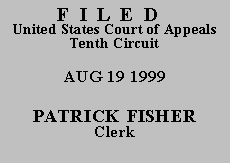

| MARC PIERRE HALL,
v.
RAY HOLT, Warden |
No. 99-1277
(D.C. No. 99-Z-594) (D. Colo.) |
Although Hall seeks release from custody as a remedy, his claims regarding unlawful segregation are actually challenges to the conditions of his confinement, and therefore are improperly brought under § 2241, which authorizes challenges only to the legality of a prisoner's custody. As we have previously explained:
Petitions under § 2241 are used to attack the execution of a sentence . . . . However, although a § 2241 attack on the execution of a sentence may challenge some matters that occur at prison, such as deprivation of good-time credits and other prison disciplinary matters, this does not make § 2241 actions like 'condition of confinement' lawsuits, which are brought under civil rights laws. A habeas corpus proceeding attacks the fact or duration of a prisoner's confinement and seeks the remedy of immediate release or a shortened period of confinement.
McIntosh v. United States Parole Comm'n, 115 F.3d 809, 811 (10th Cir. 1997) (quotation and citation omitted). Hall's Ex Post Facto argument also lacks merit, because his unlawful segregation claim fails to identify a law that has been retrospectively applied to alter the definition of what constituted criminal conduct or that increased Hall's punishment for his crime. See Lynce v. Mathis, 519 U.S. 433, 441 (1997).
Accordingly, we affirm and deny the petition to proceed on appeal in forma pauperis.
The mandate shall issue forthwith.
ENTERED FOR THE COURT
David M. Ebel
Circuit Judge
*.After examining the briefs and appellate record, this panel has determined unanimously to grant the parties' request for a decision on the briefs without oral argument. See Fed. R. App. P. 34(f) and 10th Cir. R. 34.1(G). The case is therefore ordered submitted without oral argument. This Order and Judgment is not binding precedent, except under the doctrines of law of the case, res judicata, and collateral estoppel. The court generally disfavors the citation of orders and judgments; nevertheless, an order and judgment may be cited under the terms and conditions of 10th Cir. R. 36.3.